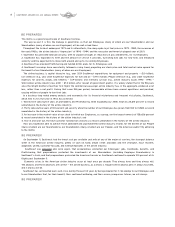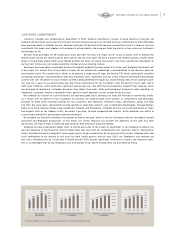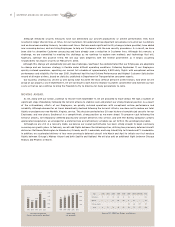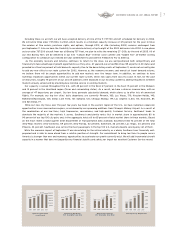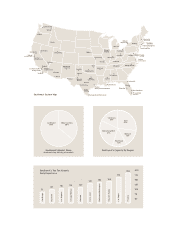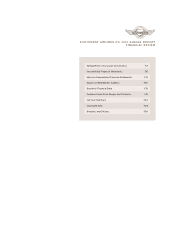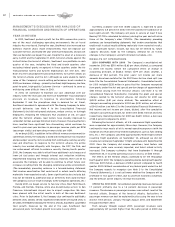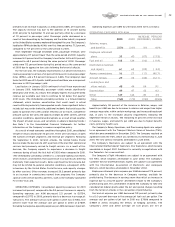Southwest Airlines 2001 Annual Report Download - page 14
Download and view the complete annual report
Please find page 14 of the 2001 Southwest Airlines annual report below. You can navigate through the pages in the report by either clicking on the pages listed below, or by using the keyword search tool below to find specific information within the annual report.
OTHER “Other expenses (income)” included interest expense,
capitalized interest, interest income, and other gains and losses.
Interest expense increased 29.1 percent primarily due to the Company’s
issuance of $256 million of long-term debt in fourth quarter 1999.
Capitalized interest decreased 11.9 percent primarily as a result of lower
2000 progress payment balances for scheduled future aircraft deliveries
compared to 1999. Interest income increased 59.0 percent primarily due
to higher invested cash balances and higher rates of return. Other losses
in 1999 resulted primarily from a write-down associated with the
consolidation of certain software development projects.
INCOME TAXES The provision for income taxes, as a percentage of
income before taxes, decreased slightly to 38.54 percent in 2000 from
38.68 percent in 1999.
LIQUIDITY AND CAPITAL RESOURCES
Net cash provided by operating activities was $1.5 billion in 2001
compared to $1.3 billion in 2000. The increase in operating cash flows
primarily was due to the deferral of approximately $186 million in tax
payments until January 2002, as provided for in the Act, which more
than offset the decrease in net income. Net cash provided by financing
activities was $1.3 billion in 2001 compared to a net use of $59.5 million
in 2000. Financing cash flows were generated from borrowings the
Company made from its $475 million revolving credit facility and the
issuance of $614.3 million in long-term debt. These borrowings were
partially offset by the redemption of $100 million unsecured notes in
2001. See Note 6 and Note 7 to the Consolidated Financial Statements
for more information on these financing activities. Cash generated in
2001 primarily was used to finance aircraft-related capital expenditures
and provide working capital.
During 2001, net capital expenditures were $1.0 billion, which
primarily related to the purchase of 14 new 737-700 aircraft delivered
to the Company, 11 new 737-700 aircraft the Company has effectively
purchased via a special purpose trust (the Trust), and progress
payments for future aircraft deliveries. See Note 4 to the Consolidated
Financial Statements for more information on the Trust. The
Company’s contractual commitments consist primarily of scheduled
aircraft acquisitions. As a result of the terrorist attacks, the Company
was able to modify its future aircraft delivery dates through the
amendment of our purchase contract with The Boeing Company and
through the creation of the Trust. Through the Trust, as of December 31,
2001, Southwest will take delivery and place in service 11 new 737-700
aircraft in 2002 and eight new 737-700 aircraft in 2003. Excluding
aircraft scheduled to be delivered from the Trust, as of December 31,
2001, the Company has no new 737-700 aircraft deliveries scheduled
for 2002, 13 in 2003, 23 in 2004, 24 in 2005, 22 in 2006, 25 in 2007,
and six in 2008. The Company also has a total of 87 purchase options
for new 737-700 aircraft for years 2004 through 2008 and purchase
rights for an additional 217 737-700s during 2007 – 2012. In total,
Southwest’s Trust deliveries, firm orders, options, and purchase rights
through 2012 are at 436 aircraft. The Company has the option, which
must be exercised two years prior to the contractual delivery date, to
substitute 737-600s or 737-800s for the 737-700s. The following table
provides details regarding the Company’s contractual cash obligations
subsequent to December 31, 2001:
SOUTHWEST AIRLINES CO. 2001 ANNUAL REPORT
F6
Contractual cash obligations by year (in millions)
Beyond
2002 2003 2004 2005 2006 5 years Total
Long-term debt(1) $40 $ 1 30 $ 232 $ 142 $ 541 $ 29 1 $ 1 ,376
Short-term borrowings 475 - - - - - 475
Operating lease commitments 290 275 243 217 1 85 1 ,590 2,800
Aircraft purchase commitments(2) 319 689 685 719 641 622 3,675
Total contractual cash obligations $1,1 24 $1,094 $1,160 $1,078 $1,367 $2,503 $8,326
(1) Includes amounts classified as interest for capital lease obligations
(2) Includes amounts payable to the Trust — see Note 4 to the Consolidated Financial Statements
The Company has various options available to meet its capital and
operating commitments, including cash on hand at December 31, 2001,
of $2.28 billion and internally generated funds. In addition, the
Company will also consider various borrowing or leasing options to
maximize earnings and supplement cash requirements. The Company
believes it has access to a wide variety of financing arrangements
because of its excellent credit ratings and modest leverage.
The Company currently has outstanding shelf registrations for the
issuance of $704 million of public debt securities, which it may utilize
for aircraft financings in 2002 and 2003.
On September 23, 1999, the Company announced its Board of
Directors had authorized the repurchase of up to $250 million of the
Company’s common stock. Repurchases are made in accordance with
applicable securities laws in the open market or in private transactions
from time to time, depending on market conditions, and may be
discontinued at any time. As of December 31, 2001, in aggregate,
18.3 million shares had been repurchased at a total cost of $199.2 million,
of which $108.7 million was completed in 2000. No shares were
repurchased in 2001.
QUALITATIVE AND QUANTITATIVE DISCLOSURES
ABOUT MARKET RISK
Southwest has interest rate risk in that it holds floating rate debt
instruments and has commodity price risk in that it must purchase jet
fuel to operate its aircraft fleet. The Company purchases jet fuel at
prevailing market prices, but seeks to minimize its average jet fuel cost
through execution of a documented hedging strategy. Southwest has
market sensitive instruments in the form of fixed rate debt instruments


